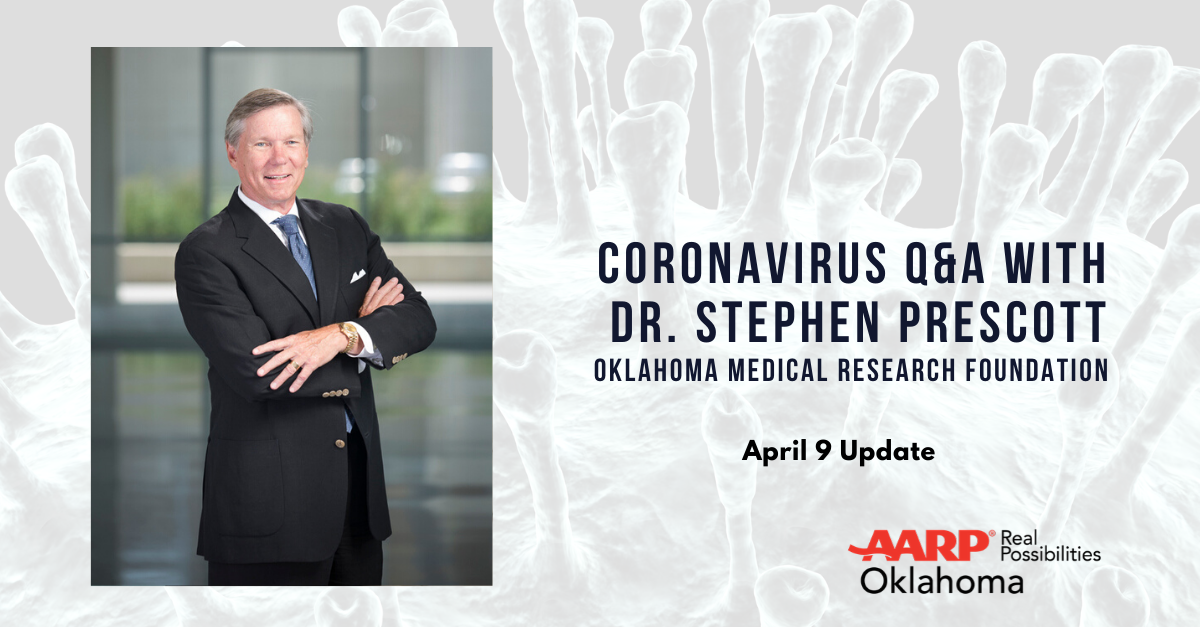AARP Hearing Center

Dr. Stephen Prescott, Oklahoma Medical Research Foundation president, answers your medical questions about coronavirus and Covid-19.
What is the link, if any, to individuals who have lost their sense of smell or taste as it relates to symptoms of COVID-19?
We have received many reports that the loss of smell and taste can be an early sign of COVID-19. In a recent scientific paper, scientists noted that similar coronaviruses like SARS or MERS can enter the central nervous system through nasal passages. That could explain why this also seems to be the case with COVID-19. While it may not mean you have contracted COVID-19, some physicians are encouraging their patients to self-isolate if they lose either of these senses. Better safe than sorry.
Statistically, Oklahoma rates 46th in the nation for health outcomes. What are the implications of these negative outcomes as it relates to coronavirus?
Even in the best of times, lung disease, obesity, diabetes and cardiovascular disease can shorten people's lives. These conditions also put people at a much higher risk of serious illness and death from COVID-19. Our low rankings potentially put our state's population at risk for a higher percentage of serious infections and coronavirus deaths compared to national averages.
How detrimental is social isolation to your health?
When your normal activities come to a halt, it can exact an emotional toll. But you can take steps to prevent your physical and mental health from deteriorating. Maintain a regular schedule. Get plenty of sleep and eat healthy meals, not just snacks or junk food. Turn off the news and, instead, read a book, work on a hobby or clean out closets. Exercise every day and get outside, if possible. And, maintain contact with friends and family by picking up the phone, sending emails, or even writing a good, old-fashioned letter. Remember, we're not alone – we are just not physically together right now.
CDC experts recently stated that there is a "reasonably good chance" that a second wave of the virus resurfaces later this year. As we look ahead, what practices should we continue or assume?
Until we develop an effective vaccine for COVID-19, we will need to keep certain social distancing measures in place. That likely means limited or no large gatherings for things like festivals, sporting events and concerts. It also will require adjustments to many aspects of everyday life, from seating in restaurants and houses of worship to many more people working remotely or in staggered shifts. Because COVID-19 can be spread by people who have few or no symptoms, it is important to keep behaving like we and everyone around us might be contagious.
Does the amount of the virus, or viral load, you are exposed to make a difference in the severity of your symptoms?
New research points to a connection between higher viral loads and more severe cases of the virus. For example, if you are exposed to a small amount of the virus from a hard surface, your chances of developing a severe case of COVID-19 appear to be lower. Exposure to a higher number of particles at once or over a prolonged period – like doctors or nurses treating many patients in China or families where multiple numbers became infected – seems to carry a greater risk for more serious symptoms of the virus.
If we make our own masks, do we need to wash them every day? If we cannot find surgical gloves, can we use fabric gloves? Would those need to be washed each day?
If someone coughs or sneezes in your vicinity, go ahead and wash your mask. Otherwise, a cloth mask is probably fine for multiple uses before washing. Cloth gloves do provide a barrier, but it is important to treat them just like you do your hands. That means do not touch your face. If you wear them in situations where you could have touched surfaces exposed to the virus, such as going shopping or unloading groceries delivered by others, you are safest if you wash them before you use them again.
Related articles:
Coronavirus Q&A with Dr. Stephen Prescott: April 2 Update
Coronavirus Q&A with Dr. Stephen Prescott: March 26 Update
AARP and the coronavirus
AARP has been working to promote the health and well-being of older Americans for more than 60 years. In the face of this pandemic, AARP is providing information and resources to help older people and those caring for them protect themselves from the virus and prevent it spreading to others. AARP is compiling facts and resources about coronavirus and how you can protect yourself. We’re updating this information as rapidly as we can to ensure our AARP members have the information they need at www.aarp.org/coronavirus.































































